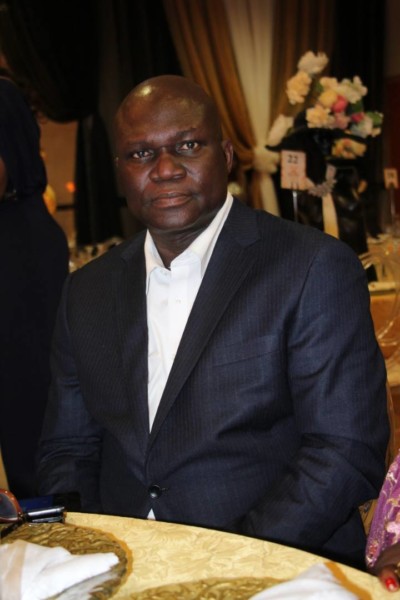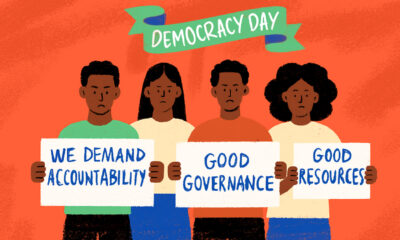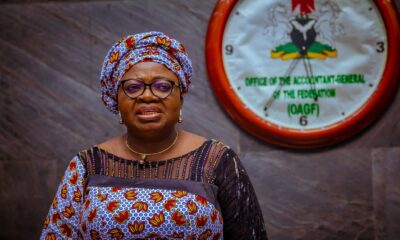Features
Reuben Abati: Amala and the Coronavirus Patient
What are we saying in Nigeria? We need all the economists, virologists, epidemiologists and all the talking heads, real and fake to start talking. What options are available? The emergency that the country faces cannot be left to the political leadership alone. We need a frank and open conversation on one critical subject: how to save Nigeria. And two co-joined things: public health and the economy.
 Of all the updates that have been given so far by the Lagos State authorities on the government’s efforts to contain the spread of coronavirus, and ensure proper care for the reported index case, and other possible cases (there is a second case now), the most intriguing update for me is the disclosure that the Italian index case who has since been quarantined at the bio-security facility in Lagos, is recovering – indeed so well that he now eats a local delicacy, called “Amala”.
Of all the updates that have been given so far by the Lagos State authorities on the government’s efforts to contain the spread of coronavirus, and ensure proper care for the reported index case, and other possible cases (there is a second case now), the most intriguing update for me is the disclosure that the Italian index case who has since been quarantined at the bio-security facility in Lagos, is recovering – indeed so well that he now eats a local delicacy, called “Amala”.
This disclosure was attributed to the Manager of the Bio-security Centre in Lagos, Dr. Bankole Akinwale. Let no one be under any mistaken impression that the doctor was trying to suggest that the eating of amala, is any form of cure for corona virus; he, being Yoruba, had to find the most graphic way to convey the patient’s health status – at the time he made that disclosure six days ago.
Amala is a special delicacy that is very popular among the Yoruba people of Nigeria. It is in two forms, white and dark brown colours: the former is made from cassava, and is far more popular among the Egba people of Ogun State. They call it Lafun. The latter which is the standard paste is made from yam.
Both are best consumed with a variety of soups particularly okro, ewedu, ogbono, or well-made egusi soup or vegetables. When a Yoruba man tells you that he is eating or enjoying amala, it is an indirect way of telling you that he is in good health. In Nigeria, it is not unusual to find persons who associate a good appetite with being well and alive. It is assumed that the sick may not really have a good appetite. This is why the moment a sick person begins to feed well, that is seen as a good sign of recovery. There may be no scientific basis for it, but at least that is what the people believe.
And so when the doctor in charge of the coronavirus isolation centre in Lagos reports that the Italian in the facility’s care has started eating amala, he simply spoke “YorubaEnglish”. An Italian eating Amala? When did he develop the taste for it?
Many of the persons I discussed the matter with began to wonder whether there is actually a kitchen at the isolation centre. We tried to imagine the recuperating Italian dropping dollops of amala into his mouth, with slimy okro and ewedu, and having a good bite of goat meat, intestine, tripe, stockfish, fresh fish or what Iya Sunday, my favourite amala seller calls “orisirisi.”
Only one person objected to the disclosure of the information about the Italian who now eats Amala.
“That was an overkill,” he said…
“It was okay to just tell us that the Italian is recovering. Telling the public that the man now eats Amala. Do you know that some hungry Nigerians can now show up at the isolation centre, hoping to also eat free Amala?, ” he added.
“God forbid! What kind of joke is that?” another person quipped. “We are talking about Corona Virus. It is a deadly disease. Why would anybody go to an isolation centre just because he or she has heard that they are serving Amala there. It is an isolation centre, not a restaurant.”
“Dey there. You don’t know some Nigerians. There is so much poverty in this land. People will do anything just to have three meals a day. Government is using its resources to address the corona virus challenge. Testing and treatment are free, and if you recover quickly, you may be served hot piping amala. People will troop down there for a free meal. And may be a bottle of beer.”
“I beg, jare, do you know if they will also serve nkwobi, isi ewu, tuwo shinkafa, and edikaikong at the isolation centre?”, one obvious clown interjected.
The conversation went on circuitously, and was beginning to assume the shape of a pepper-soup joint repartee when someone sternly reminded us all that there was nothing funny about Corona Virus and that since the index case was identified, there has been another confirmed case in Nigeria, effectively bringing up the number of cases to two. What makes it all the more frightening is the fact that the second person contracted the virus through contact with the first reported case. It has been more than a week since that Italian was quarantined in Lagos. The second reported case during that period has been out there also making contact with other people, who have also contacted others. Nigeria’s early response mechanism and multi-sectoral collaboration to contain the spread of the virus may be commendable, but two weeks later, there are obvious gaps that need to be addressed, and efforts need to be further intensified. How effective is the contact tracing protocol for the two identified and confirmed cases?
There are reported 23 laboratories and isolation facilities in the country. But what is their quality? Senate President Ahmad Lawan and a team from the National Assembly recently visited the two isolation centres in Abuja. He had to raise an alarm. He met the facilities in such a poor state, he had to threaten to return with his team within a week to check if there have been any improvements. Senator Ahmad Lawan also lamented that the Ministry of Finance has not released money ear-marked for the fight against Corona Virus. His protest helped. Three air conditioners were hurriedly installed the day members of the National Assembly visited. Other states of the Federation including Ekiti, Plateau, Benue, Kano, Bauchi, Osun, Ondo, Cross River, Nasarawa, Edo, the FCT and Ogun have announced measures to contain the spread of Corona Virus, but in reality only Lagos State appears to be better prepared. In the event of an outbreak, even the facilities in Lagos and the FCT will be overstretched.
There are lessons that we can learn from elsewhere. As at February 7, 2020, Italy reported only three confirmed cases of Corona virus. By February 16, the number had risen to 21. What followed was an explosion in the numbers. About 9, 172 people are with the virus in Italy today. Over 463 have died. Italy is the epicenter of the outbreak in Europe. Italian Prime Minister Guiseppe Conte has released a health decree imposing restrictions on the movement of people in the region of Lombardy and about 15 provinces, thus quarantining about 16 million people in Northern Italy. They are not allowed to move in and out of the territory until April 3. Violation of the restriction order will attract stiff penalties: jail time and a fine. Italy is now effectively on complete lock down. Sporting events around the world are being postponed. Football matches are now being played behind closed doors. Supermarkets, cinemas have been shut down. The United Kingdom is in a panic mode. The NHS is already overstretched. Many nations are imitating China. The United States has set aside $8.3 billion. This is not just the flu. The world is on fire!
I do not think that the average Nigerian even takes the Corona Virus threat seriously. One enlightened fellow, a man who should know, told me the other day that we don’t need to panic. He insisted there is too much hysteria over Corona virus and that in six months, it would have passed. One famous Pastor has been quoted as saying there will be rainfall before the end of the month and that rainfall will wash Corona Virus away. The Pastor has a large following. His followers believe him. In Ghana, another Pastor is now making a fortune out of what he calls Corona Virus Anointing Oil. Yes. Anointing Oil! In Nigeria, churches are also making brisk business out of Corona Virus. They are organizing prayer sessions and night vigils where worshippers hold hands, sneezing in each other’s faces and polluting the environment with saliva. Nigerian cinemas are still open and crowded every weekend. Wedding and funeral parties remain busy. People are still going about sticking out their tongues for a kiss. A serious public health crisis is most certainly around the corner. We need to be better prepared. This is how bad the situation is: Every other country began its encounter with Corona with one index case and gradually, the virus spreads…
The time has come for President Muhammadu Buhari to take personal charge of the crisis and address the nation. Human lives are in danger. The Nigerian leader must step forward and give the people hope. More so, as the Corona Virus pandemic is threatening not just the global economy but the Nigerian economy which is bound to take a terrible hit. During the last global financial crisis, Nigeria managed somehow to survive the external shocks. With the present global threat, the circumstances are different. A week ago, the Minister of Finance, Budget and National Planning, Mrs Zainab Ahmed, drew attention to the fact that the fundamentals of the 2020 Budget would have to be reviewed in collaboration with the National Assembly. When Mrs. Ahmed spoke, the spot price of Brent crude had gone down to $52 dollars per barrel due to the Corona effect on global demand for crude.
With the travel and tourism industry and the manufacturing sector shut down in many countries, oil prices have crashed. OPEC had on its agenda a discussion of further cuts for its members: an additional 1.5 million barrels per day. Nigeria’s 2020 Budget is based on a projection of 2.1 million barrels per day, and an exchange rate of N360 to the dollar. Since Mrs Ahmed spoke, things have turned worse. Oil prices have collapsed! As at yesterday, the price of Brent crude was down to $31.80. The major catalyst for this is the price war between Saudi Arabia and its long-time ally, Russia. Russia refused to agree to further production cuts, insisting it can survive on a price of $25 per barrel, and enough reserves to support its national currency, the rouble. Saudi Arabia is also threatening to flood the oil market by raising its own production level, thus forcing prices down. Saudi Arabia has a number of advantages. Russia can also absorb the fall-out.
But where does a collapse of oil prices leave Nigeria and others? Lower oil prices will affect economies that depend on crude oil. Global stock markets virtually came to a standstill yesterday. The New York Stock Exchange had to shut down for 15 minutes. Faced with the biggest shock since 1991, trading was halted. Stocks plunged. Yields on government bonds moved southwards.
What is happening is enough to cause panic in Nigeria. Can Nigeria afford to sell crude oil at $25 per barrel? Our production cost is about $30 per barrel. Our daily production capacity is between 1.7 to 2 million barrels of crude oil per day. Can we afford like Saudi Arabia and Russia to increase production?
Truth: We don’t have the capacity. Oil and gas business is oily and capital-intensive. We don’t have the resources. And even if we produce more oil, who will buy from us given the emergent energy demand crisis in the world? The worst case scenario, if the present situation persists, is a huge shortfall in Nigeria’s oil revenue. If prices fall below $30 per barrel, our economy will simply fail. We cannot boast like Russia that we have enough reserves to absorb the shocks. Our effective foreign reserves cannot offer us much protection.
The Excess Crude Account is depleted. All essential indicators: inflation, unemployment interest rates, debt to GDP ratio are all likely to rise. Nigeria thus faces the threat of another recession, and probably an inevitable devaluation of the Naira. Poverty will spread. Growth will stall.
Mr Bode Ososami, Arise News Business Analyst expressed the view on The Morning Show on Arise News yesterday morning that somehow, Nigeria is always resilient in the face of worst scenarios. I admire his optimism. But if anything, Corona Virus has exposed Nigeria’s utter vulnerability, particularly with regard to our over-dependence on crude oil revenue. When South Africa slipped into recession recently, some Nigerians started jubilating that the Nigerian economy had overtaken the South African economy. Two weeks later, Nigeria faces its own prospect of recession and yet, the South African economy is far more efficient and competitive.
Right now, the US is also mulling the possibility of a recession. The US government is talking about economic stimulus options. What are we saying in Nigeria? We need all the economists, virologists, epidemiologists and all the talking heads, real and fake to start talking. What options are available? The emergency that the country faces cannot be left to the political leadership alone. We need a frank and open conversation on one critical subject: how to save Nigeria. And two co-joined things: public health and the economy.
Yes, there is so much going on in Nigeria right now. I know that. Sanusi Lamido Sanusi, former Governor of Nigeria’s Central Bank, the outspoken and cerebral Emir of Kano has just been deposed. We can deal with that: the security implications, the morality of it, the meaning for the people of the North. Emir Sanusi didn’t need the job anyway. He has enough talent, intellect and skills to survive in the open society. His detractors may end up regretting his removal because they may have just turned him into a hero. There is also serious in-fighting in the ruling party, the APC. The gladiators should learn to keep their egos in check and put Nigeria first!. The National Assembly has also approved an external borrowing plan of $22. 7 billion: right now, who will that help? The simple point is this: nobody should play “amala politics” with Corona Virus. The President should personally lead the fight against this global scourge that threatens to cripple the economy and throw more Nigerians into poverty and misery. It is not enough to set up another committee.






















